As Spain’s 3rd largest city, Valencia is a vibrant metropolis on the shores of the Mediterranean. To help you get to know it better, here I’ve gathered a treasury of fun facts about Valencia that have piqued my interest over the years. Valencia is famous for its stunning architecture, rich history, and delicious cuisine, and is rapidly becoming one of the most sought-after coastal destinations in Europe.
Quick facts about Valencia, Spain
Location: East coast of Spain on the Valencian Coast
Population: 838,000 as of 2023
Distance from Madrid: 355 km (minimum train journey time 1h 50 min)
Distance from Barcelona: 348 km (minimum train journey time 3h)
Distance from Alicante: 170 km (minimum train journey time 1h 52 min)
1. Valencia’s history spans over 2,000 years
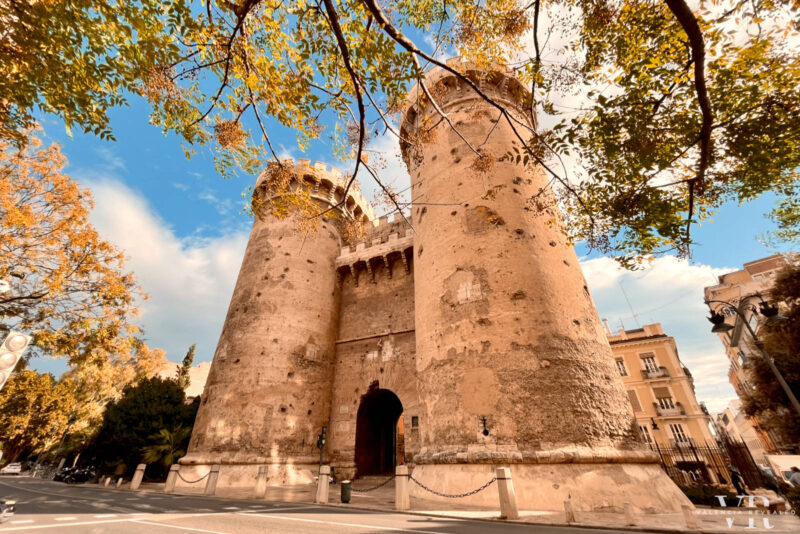
Valencia was founded by the Romans in 138 BC. A few centuries later, the Visigoths invaded and the Catholic Church took rains of the city. From 714 to 1238, Valencia was ruled by the Moors, until it fell to the troops of King James I of Aragon and became Christian again.
During the 15th century, Valencia experienced its Golden Age and rose to prominence as one of Europe’s leading cities. In the 18th century, Valencia was the top producer of silk and ceramics in Spain.
Valencia was the capital of Spain for a brief period in 1812, during the Spanish War of Independence, and then again, during the Spanish Civil War, from 1936 to 1937.
2. Valencia is the birthplace of paella
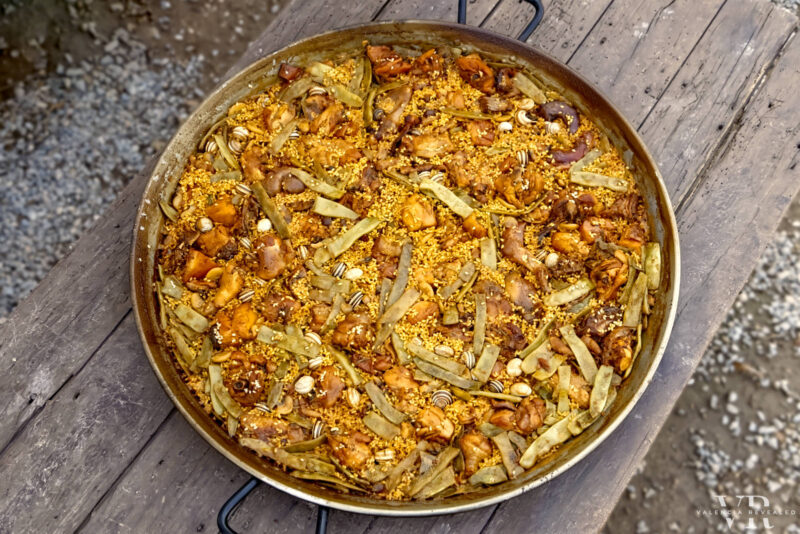
Love paella? But did you know this delicious saffron rice dish was actually first cooked in Valencia? Okay, in the tiny village of El Palmar, some 20 km south of the city, to be exact.
A fun fact about paella is that originally it was prepared with chicken, rabbit, and snails. This is called paella Valenciana and is considered to be the most authentic recipe.
While Valencia has some excellent paella restaurants, many believe the best paellas are still cooked in El Palmar. With over 30 restaurants specializing in paella and other rice dishes, El Palmar is one of the best day trips from Valencia.
3. Valencia hosts the largest street party in the world

Las Fallas Festival is celebrated in March every year and is considered the mother of all parties. For 19 days straight, locals and visitors alike, take to the streets of Valencia in search of the best falla monuments, the most delicious street food, and nightlife.
Las Fallas is not a festival for the faint of heart nor for people who value their sleep. Don’t you even dream you can escape all the people throwing loud firecrackers from early in the morning until late at night!
In spite of all the noise, one of the most interesting facts about Las Fallas is that it’s a surprisingly family-friendly festival. Even on the last night, when hundreds of gorgeous art pieces are set ablaze, kids have their own bonfires.
4. Valencia is the most liveable city in the world
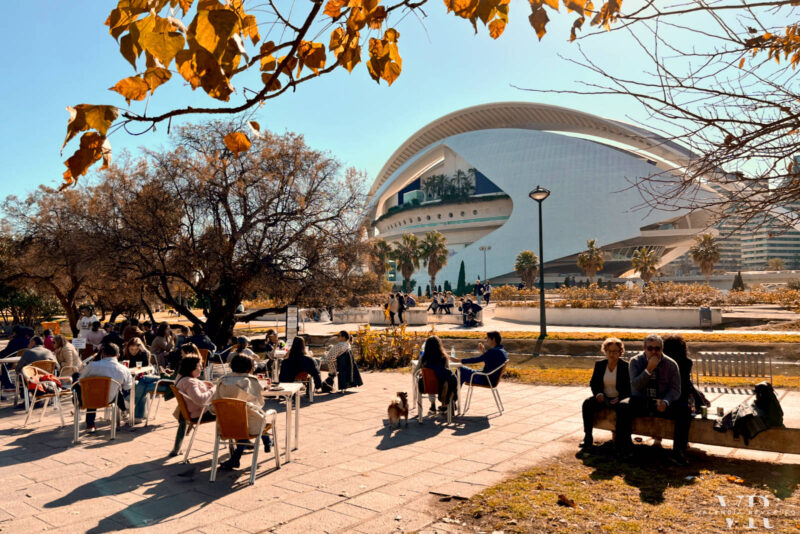
An interesting fact about Valencia is that it has been voted the best city to live in… twice! Both in 2020 and 2022, InterNations‘ users, the largest community of expats in the world, voted Valencia into first place.
Valencia ranked in the top three spots for quality of life and ease of settling in. However, it didn’t do so hot when it comes to job security, salaries, and work culture.
While no place is perfect, the point is that Valencia is a great city if you are a digital nomad or retiree. With the introduction of Spain’s new digital nomad visa starting January 2023, moving to and living in Valencia as an expat has never been easier.
5. Valencia has a park that used to be a river
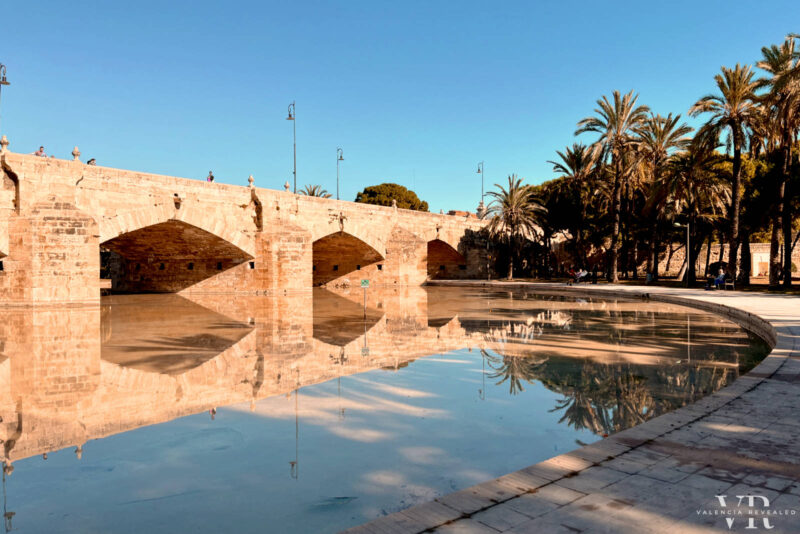
Turia Park is Valencia’s biggest green lung, but only a few decades ago it used to be a river. Notorious for its floods, eventually, in 1957, after causing a great deal of damage, the local authorities decided to divert the river to the south of the city.
After much debate, during which the idea of converting the now dry riverbed into a motorway flew around quite a bit, the space was converted into a public garden.
Interestingly enough, Turia Park is now one of the largest public gardens in Spain. It spans over 9 km, crossing the city from one end to the other, providing a fantastic space for a wide range of recreational activities.
6. Valencia is home to the Holy Grail
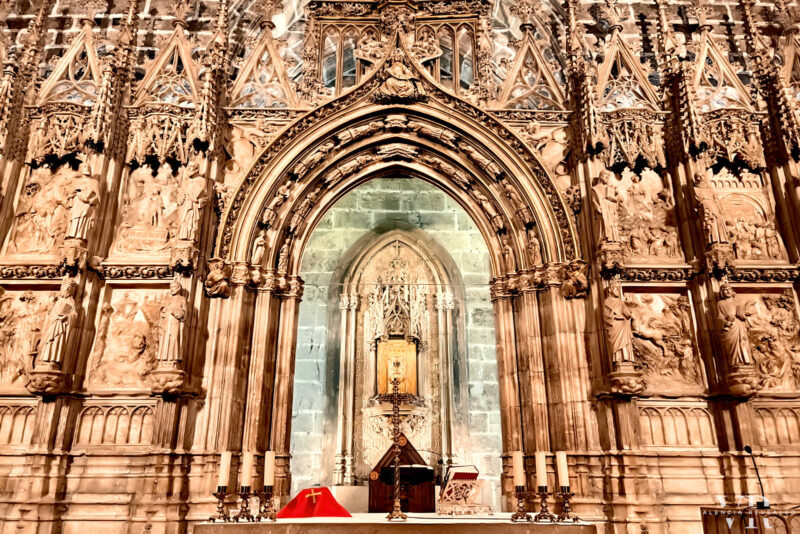
The Holy Grail, the cup from which Jesus drank at the Last Supper, is one of Christianity’s most elusive relics. From King Arthur to Indiana Jones, it has captivated the imagination of many. But, fun fact, it turns out it has been in Valencia since the 15th century.
Okay, we don’t really know whether the cup in question actually existed or was preserved, however, so far, the story doesn’t seem that far-fetched. How it got to Spain, and Valencia in particular, remains a subject of debate among historians.
What’s interesting is that the Vatican has designated Valencia as the “City of the Holy Grail”. The deep red agate chalice can be seen in a chapel inside the cathedral. The gold handles and base inlaid with precious stones are a more recent addition.
7. Valencia was the World Design Capital in 2022

Valencia has many architectural gems, ranging from the futuristic City of Arts and Sciences to Romanesque-style churches, Gothic defense towers, and stone bridges built centuries before Christopher Columbus sailed to the Americas.
So it’s no surprise the city was designated World Design Capital 2022. Valencia puts design front and center as it pedestrianizes streets and builds an inclusive and sustainable community with policies aimed at enhancing the well-being of all residents.
But that’s not all. Valencia was also named the European Capital of Smart Tourism 2022 and will be the European Green Capital 2024. On top of that, Money.co.uk named Valencia the healthiest city in the world in both 2021 and 2022.
8. Valencia has 3 UNESCO listed attractions
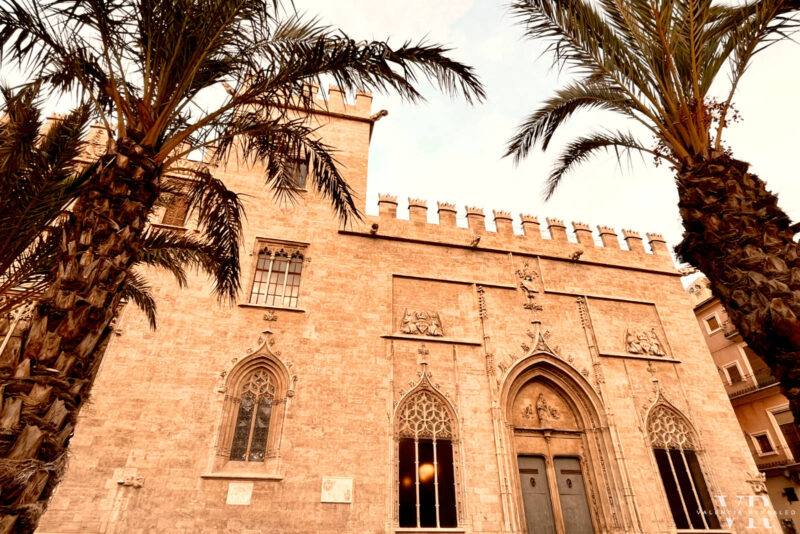
Valencia has one UNESCO-listed site and two items on the UNESCO Intangible Cultural Heritage list. Fun fact, paella Valenciana might be joining them soon.
The first to make the list was La Lonja de la Seda, one of Valencia’s main attractions. Built at the end of the 15th century, it was used as a silk trade center during Valencia’s Golden Age.
The other two are Las Fallas, the most impressive of Valencia’s festivals, and El Tribunal de las Aguas. The latest is the oldest existing justice institution in Europe, dating back to the Roman era. It meets every Thursday in front of the cathedral and it aims to solve water-related conflicts among local farmers.
9. Valencia has two official languages
An interesting fact about Valencia is that locals speak two languages – Castellano (aka Spanish) and Valenciano. Both have Latin origins. People in Valencia tend to speak Castellano, but Valenciano is widely spoken in many of the surrounding villages.
There has been a lot of commotion in the past about whether Valenciano is the same as Catalan, the language spoken in the neighboring region of Catalonia. Eventually, the Academy of the Language of Valencia concurred that despite minor differences, the two are the same language.
In Valencia and the Valencian Community, Valenciano is taught in schools as a second language. But other school subjects can be taught in Valenciano as well.
10. Valencia has its own Valentine’s Day
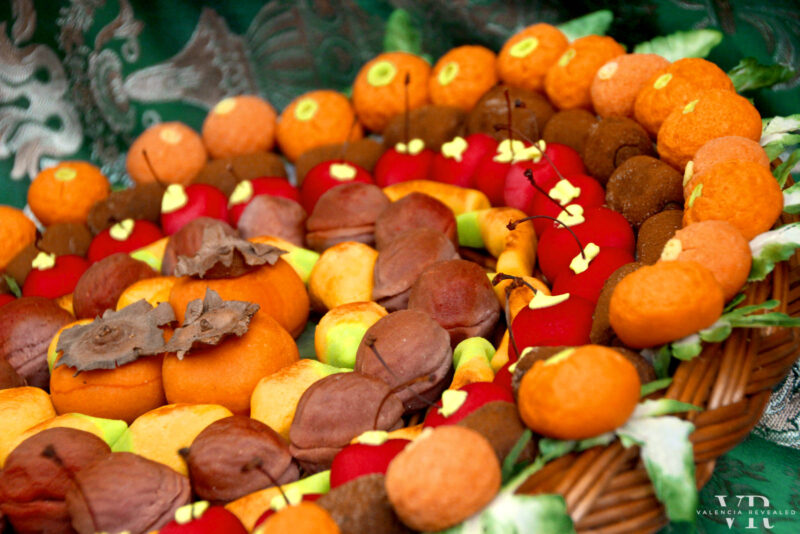
Every February 14th, Valencianos celebrate Valentine’s Day just like millions of other people around the world. But they also celebrate San Dionís’ Day on October 9th.
El Dia de San Dionís is the local version of Lover’s Day and has its origins in the 18th century. However, an interesting fact is that there are no red roses and boxes of chocolate involved.
Instead, it’s customary for men to give their partners marzipan sweets in the form of fruits and vegetable. These cute looking confectionary are made with almonds, sugar, and eggs and they are wrapped in a handkerchief or scarf, called mocadorà. Isn’t this a sweet fact about Valencia?
11. Valencia region has the highest number of Blue Flag beaches in Spain
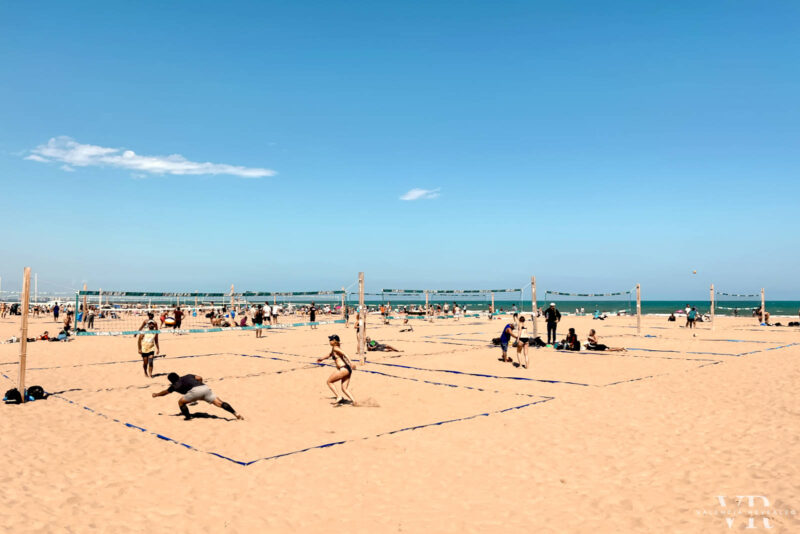
The Valencia region has an impressive 139 Blue Flag beaches as of 2022, more than any other region in Spain. To put this into perspective, the Valencia region alone accounts for 22.4% of all Blue Flag beaches in Spain, a remarkable feat in a country that has been the Blue Flag Beach world leader for 35 years.
The Blue Flag is a prestigious international award given to beaches that meet high environmental, safety, and facilities standards. In Valencia, beachgoers are truly spoiled for choice!
Remarkably, two of these beaches are located right in the city of Valencia. Playa de la Malvarrosa and Playa del Cabanyal are not only the best beaches in Valencia, but they are also among the best in the world. A fascinating fact to keep in mind as the summer season approaches!
12. The first psychiatric hospital was founded in Valencia
During the Middle Ages, mental illness was poorly understood by society. Those suffering from psychiatric problems were mistreated, and the Catholic Church’s solution was often exorcism.
But in 1409, a friar named Padre Jofré witnessed some children mistreating a man who was mentally ill near Portal de la Valldigna in Valencia. This sparked in him the idea that there should be a place to protect and take care of such individuals.
As a result of his advocacy, Hospital de los Pobres Inocentes was founded in 1410, on a street now known as Calle Hospital. Regarded as the first psychiatric hospital in Europe, the building remains standing to this day although it has been repurposed as a public library.





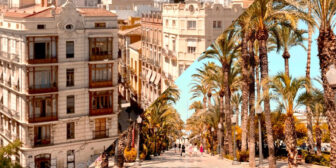
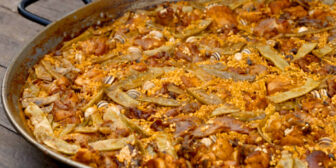
Hi Lara! My son turns 20 on the 23rd of December, two days after we arrive in Valencia. Many of the “best things to do” are shut down or Christmasified (we are not Christian). I wonder if you have a suggestion for a special thing to do that day or evening that is not in the standard websites. We’re booked for a Valencia bike tour in the morning. I see there are flamenco shows in the evening. Maybe we’ll do that again (last year we were in Seville and we celebrated his 19th birthday at a dinner/flamenco combo).
I just thought I’d ask if you know of anything else. Thanks!
Happy Birthday to your son! Dinner in a nice restaurant, maybe overlooking the City of Arts and Sciences, can be a fun way to celebrate. Also, if weather permits, a sunset catamaran cruise can be an activity a 20 year old might enjoy greatly.
Amazing website, makes me wish I was in Valencia right now.